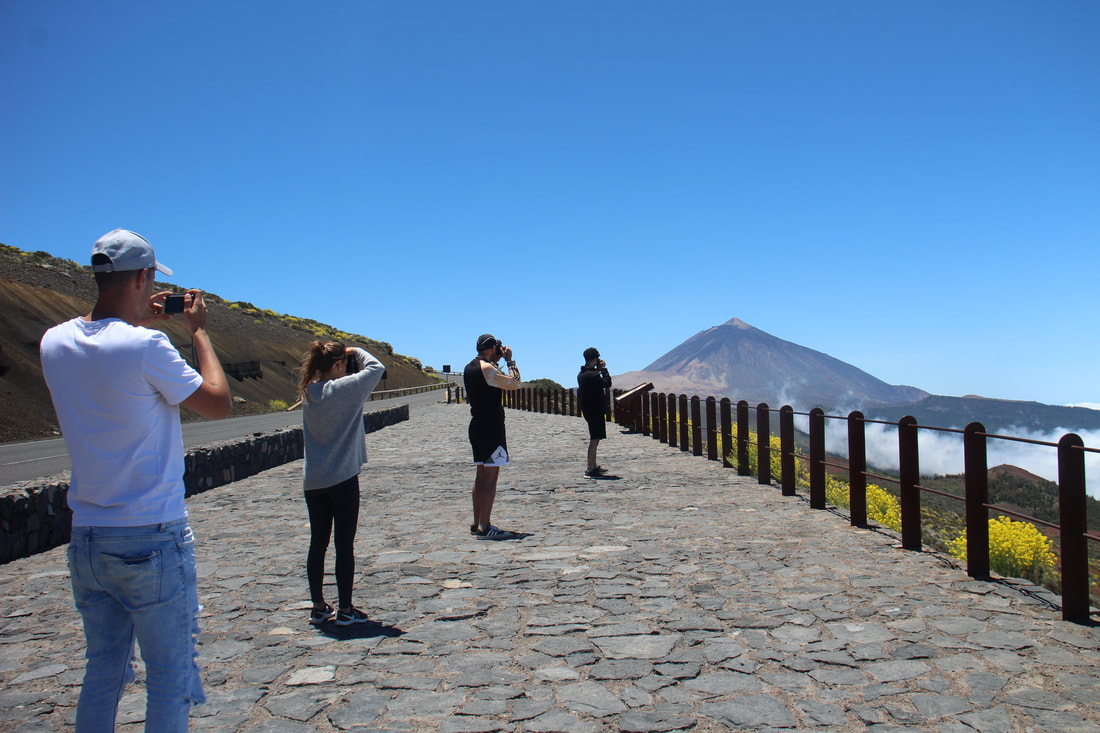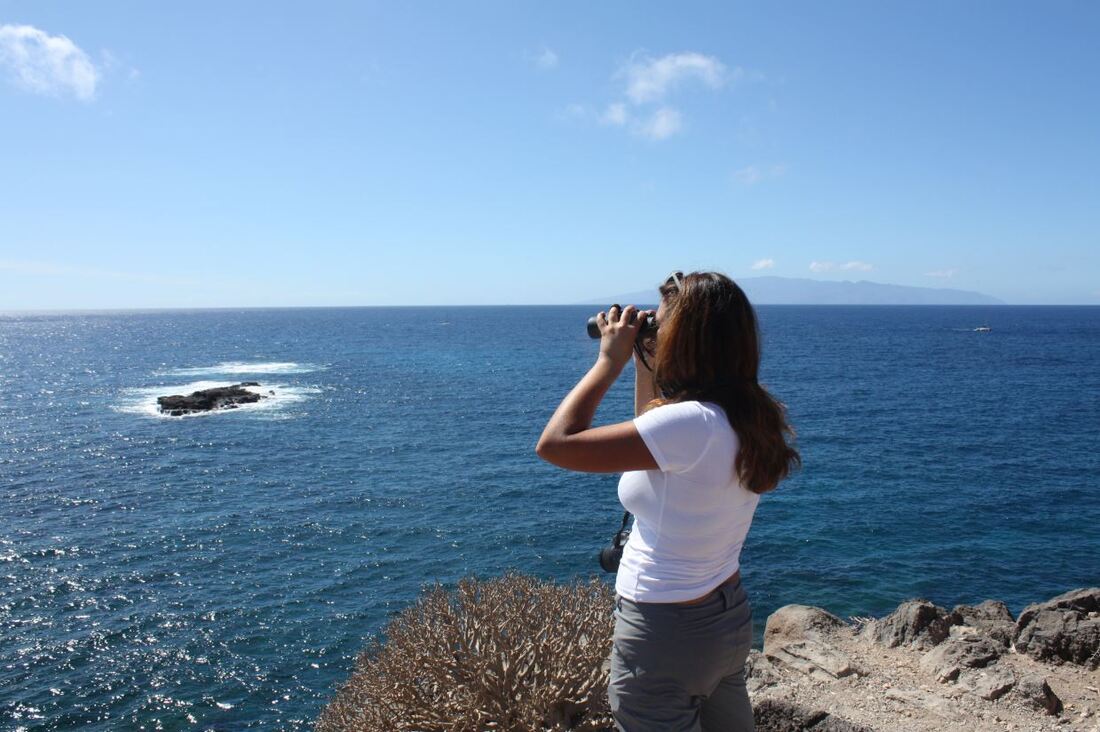Photographer: Alice Cook
The Future of Cetacean Research
Course Title: Land Based Cetacean Research
Introduction to Course
It’s not always easy spotting cetaceans from a boat in a vast expanse of sea. That’s why we’ve set up a land based research station overlooking a wide area of the sea in the search for our cetacean comrades.
This course will offer an introduction to land based surveying of cetaceans, using a range of binoculars, telescopes and theodolite. This way, we can observe multiple pods of cetaceans as well as how they behave around different boats! The course will provide you with an overview of cetacean land based studies and marine mammal observer methodologies. You can see first hand the impact of boats on cetacean behaviour during and after interactions.
Who should take this course?
Course Objectives
By the end of this course you will be able to:
This course will offer an introduction to land based surveying of cetaceans, using a range of binoculars, telescopes and theodolite. This way, we can observe multiple pods of cetaceans as well as how they behave around different boats! The course will provide you with an overview of cetacean land based studies and marine mammal observer methodologies. You can see first hand the impact of boats on cetacean behaviour during and after interactions.
Who should take this course?
- School, college or university graduates with an interest in marine science and/or conservation
- People looking for a career change, specialising in research and conservation
Course Objectives
By the end of this course you will be able to:
- Show an increased knowledge of the 28 species of cetaceans found around the waters of Tenerife
- Demonstrate greater understanding of cetacean behaviours, biology and conservation threats.
- Discuss and relay information to others about land based research and marine mammal observation literature
- Have an increased knowledge of current land base monitoring research and its practical applications in policy making and mitigation strategies.
- Critically analyse Land Based Research methodologies from around the world. By examining case studies, compare limitations and advantages of different methodologies, as well as our methodology in comparison to other methodologies around the world (This course will give you the capabilities to go and run a Land Based research programme around the world with little new training needed).
- Understand the anthropogenic threats to cetaceans including boat impact/vessel strikes and how land based research can help combat these issues
- Demonstrate why land based research is important
- Set up and correctly use binoculars, telescopes and a theodolite in an applied scientific setting
- Put land based methodology into practice, including how to scan and what to look for
- Collect and record data on cetaceans, boats and the environment from a land based station
- Identify and categorise cetaceans and vessels from a distance
- Be a valued member of a land based research team
- Understand the potential career options for someone with land based research skill
Course Structure
As a participant in the course you will be based in the AWdF land based research team, operating on a range of different land based research stations along the South West coast of Tenerife where there are resident Pilot Whales, Bottlenose Dolphins, and 24 other migratory species.
This course is designed to be an intense five day course (Monday-Friday). Students can arrive at any time over the preceding weekend, and leave the weekend following the course.
For people travelling longer distances we recommend people to take several courses enjoying increasing levels of discount. You can participate in the general volunteer programme (if staying with us) at no extra cost.
Day 1: Induction
This course is designed to be an intense five day course (Monday-Friday). Students can arrive at any time over the preceding weekend, and leave the weekend following the course.
For people travelling longer distances we recommend people to take several courses enjoying increasing levels of discount. You can participate in the general volunteer programme (if staying with us) at no extra cost.
Day 1: Induction
- Overview of Cetaceans seen in Tenerife, including resident and migratory species.
- Cetacean behaviours and data collection - Typical cetacean behaviours will be outlined, through videos and pictures, and an explanation on how to fill in our data sheets will be given.
- Land Base Methodology - How to scan, categorise vessels and what to look for when scanning, how to record environmental factors, when to take ferry inclination and bearing (if relevant)
- Equipment and set up - How to set up the binoculars, telescope/camera, theodolite and tripods.
- Use of data - Demonstrate what is done with this sort of data including the impacts boats have on cetaceans.
- Each day will be at a different site, with morning and afternoon surveys taking place.
- Upon return from fieldwork, data input training will take place.
- Analysis of relevant literature to land based research will take place, with each pair having a different section of a paper to dissect and present to the rest of the team.
Price
£500* including accommodation/food at the AWdF base
£400* for the course only (provide your own food and accommodation) *does not include flights. For an extra £100 you can also gain valuable knowledge with our Advanced Short Course in Statistics or GIS Mapping or both! Course start dates: Third Monday of every month starting in April |
Note: When you reserve your place the total amount of your booking will be shown but today you will only have to pay the £50/€50 deposit. The deposit is fully refundable in the event that you can not participate because of COVID-19.
|
Discounts are available for groups, families and course bundles, please email [email protected] for more information on pricing and discounts.
Maximum capacity per course intake - 8 people. We want to ensure that every member of the team receives one on one tailored training, limiting the number of people we can take for each intake. Places are limited so don't hesitate to book.
General Course Information
For more information about our course structure and what you are gaining by doing a Fair Earth Foundation Course, please visit our Extra Information Page.
Requirements
There are no prerequisites or prior qualifications needed to complete this course. We only want to work with enthusiastic individuals and people with great positive attitudes. We work with small groups so that we can work at different levels of ability, with tailored learning and mentorship to suit all abilities and previous experience.
How to apply?
BOOK NOW on the calendar above. For more information please email [email protected].
Application Deadlines
There are no deadlines for applications, but places will be filled on a first come first serve basis and there are limited places for each course intake. If you want to secure your place, please reserve your place for 2021 course intake now.
Maximum capacity per course intake - 8 people. We want to ensure that every member of the team receives one on one tailored training, limiting the number of people we can take for each intake. Places are limited so don't hesitate to book.
General Course Information
For more information about our course structure and what you are gaining by doing a Fair Earth Foundation Course, please visit our Extra Information Page.
Requirements
There are no prerequisites or prior qualifications needed to complete this course. We only want to work with enthusiastic individuals and people with great positive attitudes. We work with small groups so that we can work at different levels of ability, with tailored learning and mentorship to suit all abilities and previous experience.
How to apply?
BOOK NOW on the calendar above. For more information please email [email protected].
Application Deadlines
There are no deadlines for applications, but places will be filled on a first come first serve basis and there are limited places for each course intake. If you want to secure your place, please reserve your place for 2021 course intake now.

